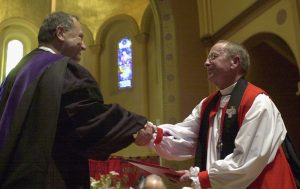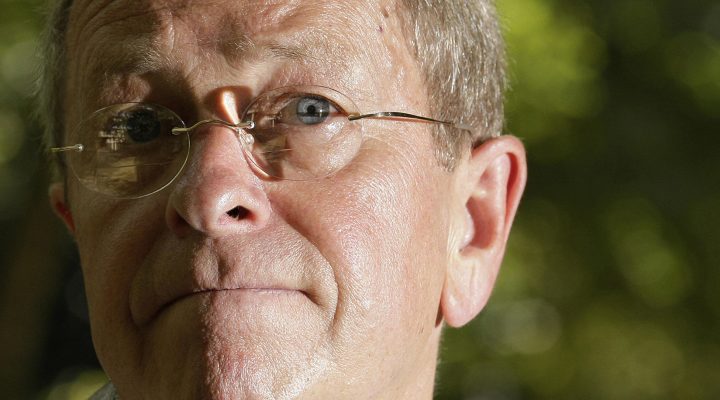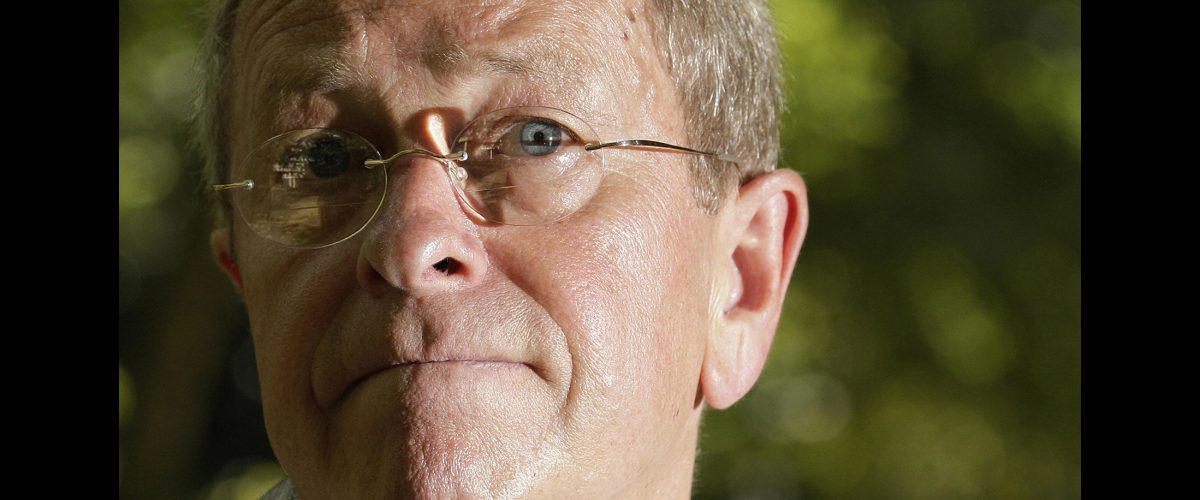Gene Robinson has trouble believing his own remarkable life has been real.
“When I look back at my life, I see myself as a third person looking back on what happened 20 years ago,” he said. “I think, ‘How in the world did I ever do that?’”
What Robinson did was to become the first openly gay priest consecrated as a bishop in the Episcopal Church. That happened in 2003. That was a landmark event not only for the Episcopal Church but also for Mainline Christianity as it opened the door to conversation about sexual orientation.
Some conservatives in the Episcopal Church left in reaction to Robinson’s selection and formed the Anglican Church in North America. The ACNA has been growing not just with disaffected Episcopalians, however, but also with former Southern Baptists.

Chair of the Board of Trustees F. Davis Dassori (L) awards Episcopal Bishop V. Gene Robinson (R) an honorary doctorate at Episcopal Divinity School graduation May 20, 2004, in Cambridge, Mass. (Photo by William B. Plowman/Getty Images)
Robinson, 77, is now retired. He considers himself privileged to have blazed such a trail. Now, he’s working on finding a new rhythm of life that includes rest. “It took me a while,” he said, “to being OK with resting.”
A glance at Robinson’s schedule, however, doesn’t reflect much rest. He remains quite active. He’s also taking up knitting.
But he can rest in the knowledge that his journey opened the door for others to follow in his footsteps. It took the Episcopal Church seven years to ordain another openly gay priest after him.
“The fact that we don’t work together, I think, breaks God’s heart.”
“Last year, I celebrated the 50th anniversary of my ordination to the priesthood and the 20th anniversary of my consecration as a bishop: 1973 and 2003. The next gay bishop that was elected in the Episcopal Church wasn’t until 2010, seven years after I was elected. I never thought it would be seven years before there’d be another one. It was hard being the only one, but there are five of them now plus me,” he said.
He understands there remains a divide between the American church and the LGBTQ community. And he fears that divide has widened. “I’ve read in a recent poll that the number of people who are against the LGBTQ community has grown.”
Even so, Robinson remains hopeful this will change. “We have way more in common than what separates us,” he said. “The fact that we don’t work together, I think, breaks God’s heart.”
Of his own story, which has been well documented, Robinson said: “I determined early on that there was nothing I could do that would make God not love me.”
Living into that belief came at a cost, however. At one point he had to wear a bulletproof vest because of the death threats he received.
“I used to laugh and say, ‘You know, there are big holes in my walls at home where I’ve punched holes through them, because I’m so angry.’ Symbolically, I saved that stuff for safe places. … I was not going to give them the satisfaction of knowing they were getting to me.”
What motivated him then and now is a pastor’s heart. He remembers his call to ministry.
“I remember a speech I heard at a graduation service, where the speaker mentioned that their concern for the graduates was that they talk about the good news, but when he looked at them, he didn’t see much joy. I wanted people to hear the good news, but I also wanted them to see it and take from their observation of me that knowing and loving Jesus made you happy and fulfilled. And able to accomplish amazing things. It doesn’t make you judgmental and ornery and demanding.”
Robinson said his prayer life helped him navigate both his position as a bishop and the normal struggles of life.
“My prayer life has been a series of praise and then intercessions for people,” he said. “My spiritual director said to me, ‘You talk too much in your prayer life. God knows who’s sick. God knows what’s going on in Ukraine and Gaza. He’s got it.’ She challenged me to settle myself down, close my eyes and imagine God’s love starting at the top of your head and oozing over your whole body like warm butter. Just let God love you because God does.”
Related articles:
‘Orthodox’ does not mean ‘conservative’ | Opinion by Eugene Schlesinger
The two men behind the possible schism in the Church of England | Analysis by Kristen Thomason
Let’s show Christian kindness to LGBTQ people and their advocates | Analysis by Robert Sellers


